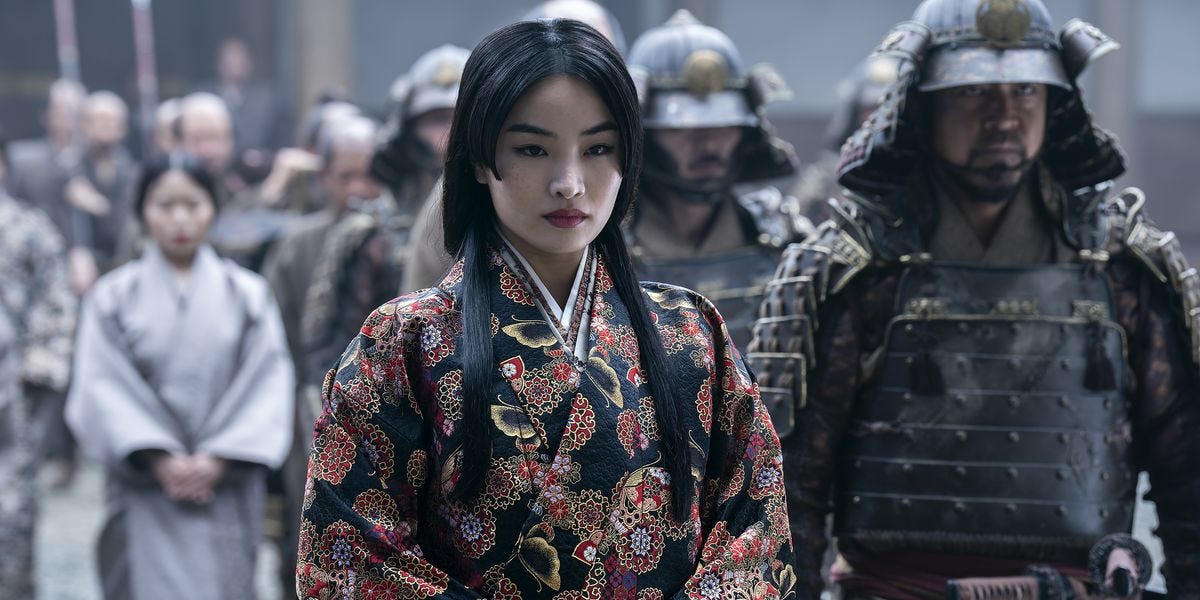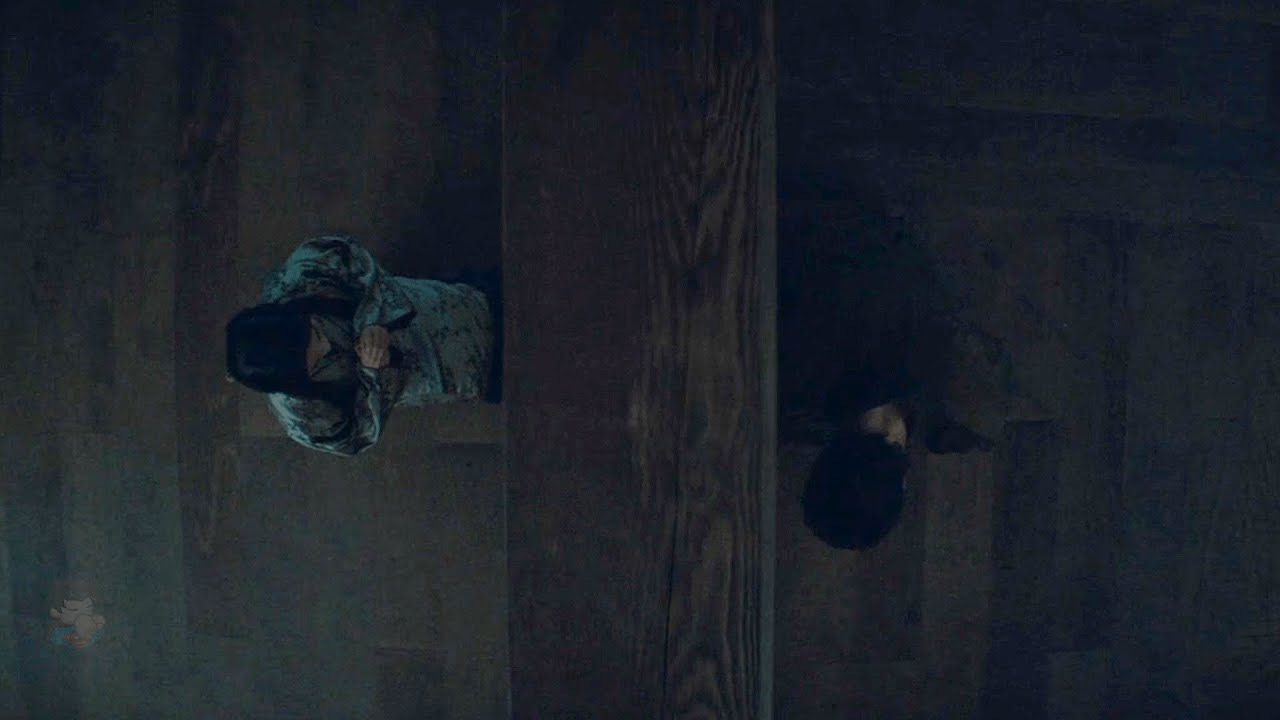Shogun and Translation: How to Miss Something You'll Never Really Know
Something lost, something gained.
Shogun is a pretty monumental signifier of the evolution of storytelling in Hollywood. Year over year there is more and more data that supports the fact that subtitles are not a deterrent to English-speaking audiences. There are movies that win Oscars, shows that break records, and the success of Shogun is further progression in North American story development and production.
Yet, I was still surprised that the show is mostly in Japanese. And really, there is no other way to make this show, one that relies so much on the act and art of translation, but still. I have spent my whole life dividing stories in my head into boxes of foreign and not. Of English and not.
Isn’t that an odd way to grow up? While I can’t remember learning it, my first language was Korean. It used to be my mother tongue, and there are moments when I can feel like that was once true, words spontaneous and fleet. But just as quickly, my mouth stumbles, unable to fathom the shapes it needs to make and I hear my own accent and cringe. I know it’s wrong, but I don’t know how to make it right either. Instead, I'm constantly stuck at the locked gate between foreign and known, the password in my head, but lost on the way out of my mouth.
What I remember from growing up are the times when English was home, and everything else, when Korean, was not. This language that my mother speaks, that my father speaks, that my whole extended family speaks, is the foreign one. I remember how much I shied away from it, so uncomfortable in language classes where everyone forced me to speak something that felt incorrect to me. Today, I’m forever grateful that I went as long as I did, despite the tears and how scared I felt on those Saturday mornings. I think about all I’ve already lost in the gap of my skills, something I’ll never truly know, but that I know I’m missing, and try to hang on to what I do have.
So English stories became the default, it became the shows, the movies; the de facto rom-coms, comedies, tragedies and happy endings, while everything else became foreign—my own mother tongue became a mystery. But Shogun is both foreign and not. It is both and neither.
Maybe that’s been a possibility all along—to be both where you came from, and where you are, and something else entirely.
Presence is Most Keenly Felt in Absence
There was this nagging sensation that I was missing something while watching Shogun. It’s a familiar sensation, one that happens all the time. It’s something that has to be accepted while watching or reading any translated story, but it’s always irritated me, despite how common it is. Like anybody who knows more than one language (more than half of the world’s population speaks at least two languages), it’s well-known that no matter how good a translation is, there is a layer of meaning that can never be conveyed outside of the source language. Language is the centre of a culture and living that language, thinking and feeling and dreaming in that language is the only way to get a truly complete understanding. While fluent bilingualism is common, that’s not the same thing.
And that’s sad and frustrating to experience, but in the context of Shogun, it’s also magnificent. There is power in that lack, to so keenly feel that something important is missing, to put viewers in a situation where they have to navigate a world without ever knowing what that missing thing is. It’s a small but significant subversion of power where English is the disadvantaged language on two different levels: for John Blackthorne within the storyworld, and for the audience watching. It’s this great meta storytelling tool where what the viewer is missing is also what Blackthorne is missing. This character, our fish-out-water who’s plunged into a world he does not understand, that he will get infinitely closer to, but will never be able to understand entirely, is us. We are sharing the same experience.
Watching Shogun is an exercise in enduring absence, forced to face that unknowable gap in which meaning falls, a chasm stretching between English and Japanese. It’s a gap that I’ll never bridge, even if I did learn Japanese to some fluency, and that is the gorgeous and terribly painful thing about Shogun, a show in which translation and communication are everything. The audience is acutely aware of how much they don’t understand, and that tension between knowing and not knowing makes this show impossible to turn away from.
When you don’t know the source language, you have to have a lot of faith in the translated subtitles. You’ll never know, so there’s an implicit trust you must give to the small letters that run across the bottom of the screen. That trust isn’t always warranted because translations can suck. I have watched many Korean dramas where I knew the subtitles were off. Not incorrect, exactly, just weird and wrong-feeling because they didn’t maintain the spirit of the original dialogue. You could see that disconnect as you watched the characters on the screen and the subtitles just not quite line up with their intentions.
And it’s just so sad to me, to know you’re missing something but not ever get to know what it is that you’re missing. It sounds silly, but it’s like forgetting something and feeling like it was important, but you don’t know because you forgot what it was. Maybe you’ll remember it, but maybe you won’t and then it’s lost forever and all you’re left with is this terrible feeling that you lost something. Just this space that nothing will fill quite right.
Set in an era where violence and death are commonplace, loss plays a significant role in Shogun. But it’s more than death, more than losing land and armies and a throne or even a sense of self that you’re forced to reckon with. Shogun has you grieving something you cannot quite define.
Mariko-sama, Translator: The Heart, Soul and Compass

Mariko’s relatability is razor sharp, an acute stab right to the chest. There’s an unbroken line connecting the things she endures to the things I have endured, that many women continue to endure. It is a show that is set over five hundred years ago, based on a woman who lived at the command of her husband but died by her own will, and in this way, it feels like not much has changed since then and now. That the expectation to be small and weak, silently dutiful and subservient; to be seen and not heard is one that has travelled through centuries of time, and has perhaps shape-shifted, but never truly changed.
Mariko is the cornerstone of this show. She plays a dozen different roles, maintaining the duties of a vassal, a woman, a wife, a mother. Of a highborn lady, a political advisor and daughter of a lost father. She is a descendant of one thousand years of samurai. She is all of these things, and she is beholden to each and every title and legacy. Every time she speaks, she must balance all them, all while she aims to be true to the heart that is all her own.
Shogun is a beautiful show full of pathos and triumph. Anna Sawai’s portrayal of Mariko-sama stretches and spreads to fit the scale of the show. She feels grand and epic while touching upon something personal. She is somehow both larger than life and deeply intimate. Rarely do you see who she is beyond her facet of Mariko-sama, Translator and Vassal of Lord Toranaga, but when you do, you see a glorious fire raging.
If I could use words
Like scattering flowers and falling leaves,
What a bonfire my poems would makeMariko’s death poem.
She’s a translator, but she has very few opportunities to actually speak. This poem is just a peek into a facet of her that she keeps hidden out of necessity. Mariko is bound by centuries of culture that forbid her from saying what is exactly in her heart. She has become very good at translating her intentions into the words she can say out loud. Her mastery of haiku is borne of this process. It’s not only emblematic of who she is, it’s evidence of how she’s lived her life. She’s had so much practice in crafting meaning in what is left unsaid. In shaping the empty space between syllables.
She is not just translating between Japanese and Portuguese (portrayed as English in the show, a choice that’s both logistical and artistic to fantastic effect) She’s translating her emotions and motivations from her internal self into a form that is considered acceptable to society, while also shaping her translations to direct and influence, while also ultimately being accurate. Dozens of strings, each a minor labour to pull, each one adding up to an intense life-or-death dance.
As the official translator, Mariko is often put into challenging positions, torn between priorities, and it reminded me of R. F. Kuang’s Babel. The book made its rounds on BookTok in 2022, specifically in reference to this quote:
Betrayal. Translation means doing violence upon the original, it means warping and distorting it for foreign, unintended eyes. So, where does that leave us? How can we conclude except by acknowledging that an act of translation is always an act of betrayal?
This idea of translator as traitor is centuries old. Originally attributed to Italians in reference to French translations of Dante, they said: “Traduttore, traditore”, which translates directly into “Translator, traitor”. The gap between what is meant and what is said is well-established. It’s called a lacuna or lexical gap—something irreplaceably missing between two languages. To make something fit into a shape it was never meant to occupy does feel like a knife, carving away until what’s left is unrecognisable from the original. Of course, there is truth to this, but in Shogun, Mariko shows translation as something else, too.
In earnestness, I think translation is an act of hope. A gesture of faith in a stranger. What else could it be when you know that what’s in your mind will never quite be what makes it into theirs? Each time we translate, what lies behind the literal words is “Here is what I am willing to sacrifice, this part of myself, so that I can connect with you.”
Often, it’s more utilitarian in nature and less romantic than what I’m describing, but still, the core of what happening is a plea to be seen. Every translation is a bid for connection. It’s someone reaching out to say “Please understand me. Please hear me. Please see me. I am here and this is all I can say, but please, please reach back. Meet me somewhere I can also see you and find comfort in your presence. In the knowledge that you know me, even incompletely”.
There’s nothing more vulnerable, nothing more human, and Mariko embodies the strength of this until the very end.
I think that the knee-jerk reaction after watching episode nine is to mourn how Mariko died. To even feel bad for her, but that’s wasted energy. Mariko is someone to admire. She made her own choices, despite everything and everyone that told her she couldn’t, and that she shouldn’t even if she could. She died exactly the way she wanted to. She lived a life that she could always stand by. She wasn’t able to do everything she wanted, but there is a nobility to the quiet resistance she acted upon from the day her father was put to death for treason, to the last breath that she took. She made every effort to stay true to all her hearts against everything that told her to compromise, and that is something worth emulating.
Translation is Part of Life
My entire childhood was riddled with subtitles. Pixelated anime and Korean dramas on an old computer. American action movies with my parents. Korean subtitles under the movies burned onto DVDs from effective but questionable websites. We had hundreds of DVDs, I watched most of the movies of my childhood this way. Movie theatres were for special occasions and Blockbuster DVDs only had English and French subtitles.

But also, there was just every day. Invisible subtitles running through my life for as long as I can remember. Once I got into school, my English quickly outpaced any Korean I had known, and I don’t really remember a time when I didn’t play translator. Reflecting back, I think of how much hope my parents must have had for their daughter to come to Canada and pick up English as quickly as I did. I also think about the grief they must feel when they realised their daughter no longer understands them the way they speak best. My view into the language they feel in, the language they dream in, is permanently obscured. That grief is a mirror reflection of my own. I will always yearn for the kind of connection that could have been, something I will never know, but forever miss.
I don’t see a day when I stop trying, though. I can mourn what will never be while never giving up what I do have. Sometimes they are half measures, but they’re approached with a full heart. That’s not to say I’m not frequently awful at it. I’ve been doing this my whole life and I still fail all the time. It is frustrating and tedious work to try and make sense of your emotions in a language you don’t feel them in. I’d get so mad when they didn’t understand. It’s easy to fall into that trap of frustration and anger, I’m definitely not immune to it. But Shogun, even with its historical rigour, is an important reminder that this is normal.
We all forget important things, all the time. We live with the knowledge that we are missing something, and those spaces are filled and then made over and over again, and nothing is a perfect fit. But a life of incomplete understandings and patchwork signals is very mundane. We will forever be trying to be understood in our entireties, and while nobody is equipped with all the right languages, we owe it to each other and to ourselves to try.
Small note: Apologies for the day’s delay on this week’s article, I am aiming to be a bit more consistent in the future! 🙇♀️







"In earnestness, I think translation is an act of hope. A gesture of faith in a stranger" WOOOOW I LOVE THIS.